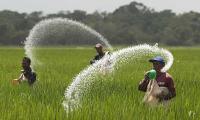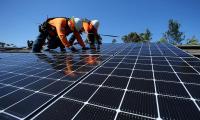India to Increase Nano Liquid Urea Plants to 13 by 2025
India plans to increase the number of nano liquid urea plants to 13 by 2025, aiming to meet domestic demand and reduce fertiliser imports. The move is seen as a game changer, potentially boosting exports.

Illustration: Dominic Xavier/Rediff.com
New Delhi, Dec 12 (PTI) The total number of plants producing nano liquid urea in the country will be increased to 13 from nine at present by 2025, Minister of Chemicals and Fertilizers Mansukh Mandaviya said on Tuesday.
These plants would cumulatively produce 44 crore bottles of 500 ml nano urea and DAP (di-ammonium phosphate), which help fulfil domestic demand and reduce dependency on fertiliser import.
"Nine plants are already operational and by the end of 2025, 13 plants will be operational, producing 44 crore bottles," said Mandaviya, while replying to a question in the Rajya Sabha.
Terming it a "game changer", he said this would not only fulfil the domestic requirement of nano urea but boost exports as well.
The government is creating an eco-system of spraying these nano-urea in farms using drone technology.
Under 'Viksit Bharat Sankalp Yatra', a demo and training is being given to farmers for the use of nano urea through drones.
"Use of nano urea and nano DAP is accepted as an alternative fertiliser on large scale," he said.
The government has brought several changes in the fertiliser sector, Mandaviya said.
"Traditionally, we were using chemical fertiliser such as urea and DAP," he said, adding that this government had taken initiatives for alternate bio fertilisers.
This also helped reduce dependency on the import of fertilisers and increase production through indigenous methods, he said.
"India was the first country to introduce nano urea and nano DAP," he said, adding that one bottle of 500 ml replaces a bag of urea or DAP.
Replying to a question by BJP MP Iranna Kadadi on whether there is any scheme to incentivise cow dung for use as bio fertiliser, Mandaviya said under Gobar Dhan Yojana, it provides a subsidy of Rs 1.5 per kg under Market Development Scheme.
This will help provide organic fertiliser and help in getting more income to the farmers, he added.
Replying to a question from Sasmit Patra of BJD on the status of the Talchar fertiliser project, Bhagwanth Khuba, MoS Chemicals and Fertilizers, said half of the work is completed and the target is to start the gas-fired unit in 2024.
These plants would cumulatively produce 44 crore bottles of 500 ml nano urea and DAP (di-ammonium phosphate), which help fulfil domestic demand and reduce dependency on fertiliser import.
"Nine plants are already operational and by the end of 2025, 13 plants will be operational, producing 44 crore bottles," said Mandaviya, while replying to a question in the Rajya Sabha.
Terming it a "game changer", he said this would not only fulfil the domestic requirement of nano urea but boost exports as well.
The government is creating an eco-system of spraying these nano-urea in farms using drone technology.
Under 'Viksit Bharat Sankalp Yatra', a demo and training is being given to farmers for the use of nano urea through drones.
"Use of nano urea and nano DAP is accepted as an alternative fertiliser on large scale," he said.
The government has brought several changes in the fertiliser sector, Mandaviya said.
"Traditionally, we were using chemical fertiliser such as urea and DAP," he said, adding that this government had taken initiatives for alternate bio fertilisers.
This also helped reduce dependency on the import of fertilisers and increase production through indigenous methods, he said.
"India was the first country to introduce nano urea and nano DAP," he said, adding that one bottle of 500 ml replaces a bag of urea or DAP.
Replying to a question by BJP MP Iranna Kadadi on whether there is any scheme to incentivise cow dung for use as bio fertiliser, Mandaviya said under Gobar Dhan Yojana, it provides a subsidy of Rs 1.5 per kg under Market Development Scheme.
This will help provide organic fertiliser and help in getting more income to the farmers, he added.
Replying to a question from Sasmit Patra of BJD on the status of the Talchar fertiliser project, Bhagwanth Khuba, MoS Chemicals and Fertilizers, said half of the work is completed and the target is to start the gas-fired unit in 2024.
You May Like To Read
TODAY'S MOST TRADED COMPANIES
- Company Name
- Price
- Volume
- Vodafone-Idea-L
- 11.65 (+ 3.56)
- 106772451
- Alstone-Textiles
- 0.28 ( -3.45)
- 44187760
- Mangalam-Industrial
- 0.88 ( -2.22)
- 39177573
- Sunshine-Capital
- 0.27 (+ 3.85)
- 35956340
- GMR-Airports
- 104.40 (+ 6.37)
- 30453005





